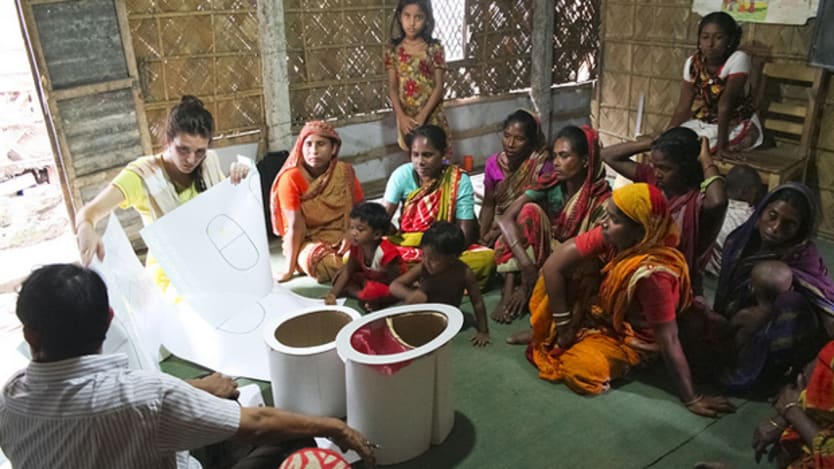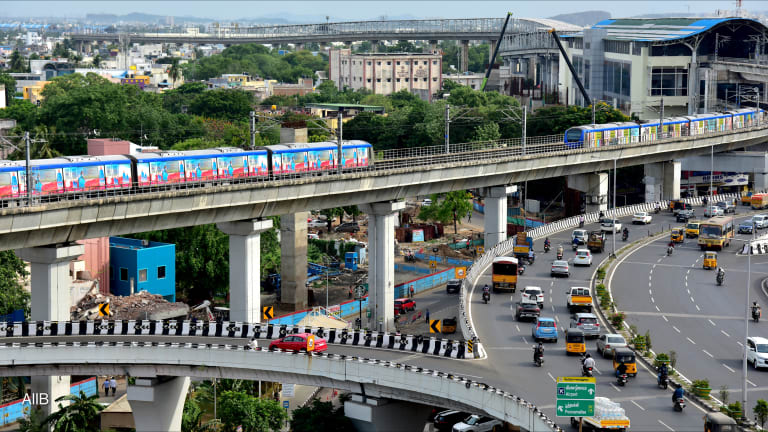
I have enormous pride in what my own country, Bangladesh, has been able to achieve in virtually eliminating open defecation over the last two decades, and often ask myself why other countries haven’t achieved the same. Even today, 1 billion people still practice open defecation around the world.
The challenge to eliminate this practice by 2030 is not trivial. The good news is we now know what it takes and that’s why I’m optimistic this goal is feasible.
Political will
Over half of the people practicing open defecation live in India, and while there have been marginal reductions over the last 10 years there, Prime Minister Narendra Modi’s administration is now prioritizing this issue and elevating cleanliness and sanitation as a national development priority. Such political will at the highest level is absolutely fundamental, as demonstrated by other countries such as Indonesia, Bangladesh and Ethiopia. Once political will is harnessed, the path to eradicating open defecation falls within the line of sight.
A focus on behavior change
For many I know this is well-understood, but it is a message worth repeating: Our government counterparts from the national to the municipal and local levels, along with development partners and donors, must internalize that changing behaviors cannot be an add-on. It has to be central to any plans or programs to eradicate open defecation.
The negative externalities of open defecation are clear: If entire communities and social norms are not shifting, then the health and economic benefits will not be realized. These negative externalities cost countries such as India the equivalent of 6.4 percent of their GDP. Interventions that focus on collective behavior change and shifting social norms are vital in this war on open defecation.
In rural India, there are places with signs that say: “We will not give our daughters in marriage to someone from a village that doesn’t practice total sanitation.” This is the type of social movement that is required. Yet we must use all tools that are at our disposal.
We live in a world where the private sector is able to understand consumer profiles of those living in the most remote locations. In almost every village in the world, you can find a cell phone or a bottle of Coca-Cola. By harnessing the expertise of the private sector in understanding what consumers want, need, the way they think, believe and act, we can mobilize state-of-the-art behavior change communications to accelerate the eradication of open defecation.
Sanitation solutions that offer a better value than open defecation
Defecating in the only option for some, but for others it is the preferred method. Using a local river or stream, or even the bush, may feel better than using a hole in the ground that smells or has flies and lacks light.
See more of our coverage on sanitation and WASH:
● Moving beyond the tippy tap
● 2 million in 2 years: How simple solutions are changing lives
● Developing countries, partners renew WASH pledges
Marketing 101 tells us that we have to offer solutions with benefits that outweigh the benefits of open defecation. Whether we recognize it or not, the private sector is the main provider of on-site sanitation, which is realistically the only option for the vast majority of those who defecate in the open. But these local firms and small-scale enterprises often operate in environments with fractured supply chains and limited capital to innovate around product design to meet consumer needs and overcome high transport and distribution costs.
The opportunities to be creative and seek public-private partnerships with large and small-scale firms and enterprises are endless. But the key in this partnership is to understand what consumers want — particularly the poor consumers — and what are they willing and able to pay for. We know that public sector supply-driven sanitation programs fail because demand for sanitation is not created and the sanitation solutions are not consumer-sensitive.
Stronger public sector local service delivery systems
Local district and village capacity is of utmost importance. This means that local leaders and frontline workers have to have the capacity, technical knowledge and incentives to engage communities with behavior change interventions and facilitate interaction with private sector providers.
To eliminate open defecation, there is ample room to break down sector silos and have this be a common development issue across water, health, nutrition, education and poverty reduction programs to create an army that is needed to fight this war on open defecation. Examples from places such as Indonesia, Ethiopia and Bangladesh, and even states within India such as Maharashtra and Himachal Pradesh, again show how public investment in building the capacity to deliver behavior change interventions rather than simply constructing toilets is good value for money.
Creation of the right incentive structures
It is important to use both financial and nonfinancial incentives. Local service delivery mechanisms need financial resources to deliver, but this can also be buoyed by nonfinancial incentives as well.
Human beings are inherently competitive in nature and take pride in achieving goals. Benchmarking local and subnational governments against a common goal of eliminating open defecation, praising those who meet and sustain their objectives and facilitating local and international knowledge to those who are lagging will be instrumental.
Each country context is different and there is no one-size-fits-all solution. However, if we build on the experience from countries in the last decade and harness the power of the public and private sectors, I have no doubt in my mind that the world can end open defecation by 2030. Achieving this goal is not an end in itself but a means to an end to achieve other goals.
We cannot end extreme poverty by 2030 and boost shared prosperity for the poorest 40 percent without fixing poor sanitation. Eliminating open defecation must be central to our development efforts.
Join the Devex community and access more in-depth analysis, breaking news and business advice — and a host of other services — on international development, humanitarian aid and global health.








